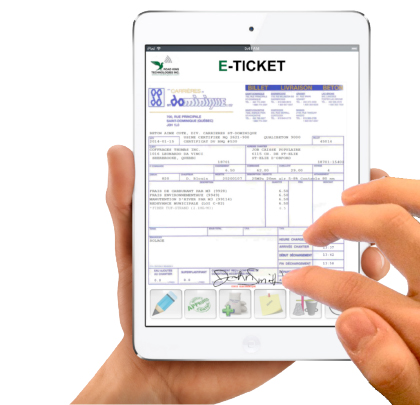As commerce expanded, a new way to handle customer purchase orders, change orders, confirmations, shipping advises, invoicing, etc. had to be developed.
EDI (electronic data interchange) provided a technical basis for commercial “conversations” between two entities, either internal or external. EDI constitutes the entire electronic data interchange paradigm, including the transmission, message flow, document format, and software used to interpret the documents. This first appeared in the mid-1980’s (pre-Internet) using modems (300 to 1200 bps). All documents had to conform to a particular protocol of forms, and programs were always a WIP and prohibitively expensive. All of this was created with a view to reducing paper and paper handling.
 Think about it. With this “paperless office”, there is no more printing a delivery ticket, matching the POD (Proof of Delivery) ticket to a customer’s order, printing customer invoices and bursting the six-part invoice, and filing in binder, salesman’s copy, customer file, etc. There is no more matching invoices with POD’s, printing, and mailing customer monthly statements, printing and filing sales journals. No more paper … period.
Think about it. With this “paperless office”, there is no more printing a delivery ticket, matching the POD (Proof of Delivery) ticket to a customer’s order, printing customer invoices and bursting the six-part invoice, and filing in binder, salesman’s copy, customer file, etc. There is no more matching invoices with POD’s, printing, and mailing customer monthly statements, printing and filing sales journals. No more paper … period.
[h3]HERE’S HOW IT WORKS[/h3]
A customer calls in an order which is entered into the system and processed by the dispatcher. On the day of the scheduled delivery, the dispatcher allocates the next delivery to an available truck and produces a “Delivery Ticket.” Rather than printing it on a printed form, it is sent through the Internet to a tablet in the form of a dynamic eTicket.
If any additives were required, the driver can select from a list on the jobsite, which will be added to the ticket before the signature. At this point, the completed ticket is ready to be signed. Once signed, it becomes a POD (Proof of Delivery) and is sent through the Internet, back to our servers, processed as a PDF, and sent as an attachment to an email to a predefined list (accounting department, customer’s account payable, etc.)
You may be thinking this would be a “nice to have” feature. But in today’s competitive market, this has become a “need to have” feature, and here’s why.
With the current process, it takes an average of approximately 5 minutes per delivery ticket. The driver returns from a delivery and parks the truck, walks over to the dispatch office with the signed POD of the last delivery ticket, and surrenders the ticket to the accounting department. The driver then goes to dispatch for the next delivery ticket, gets special instructions, including directions to the next jobsite, has a cigarette and cup of coffee, discusses last night’s hockey game, and walks back to the truck. Now, with the eTicket, the driver no longer has to deal with the paper delivery ticket because it’s on his tablet automatically.
[h2]IS IT A GOOD INVESTMENT?[/h2]
To quantify, let’s consider the following model: A company with 20 trucks can save as much as $82,450, net, after paying back the initial outlay for the tablets in approximately 3 months. This gives you a 286.3 percent ROI (Return on Investment).
With the Road King Technologies eOffice in place, the POD and all its elements are then processed as an electronic invoice and sent to the customer’s accounting department in the form of a PDF document accompanied by the respective POD’s as an attachment to an email.
The effect of a paperless invoice, without having to burst multiple copies, matching the invoices to the proper customers’ orders, and then filing them into a sales binder, customer’s file, salesman’s file, accordingly, results in an additional saving, using the same model of 20 trucks, of approximately $102,000 for the year with a payback of 4 months, and a 683.3 percent ROI.
Ask yourself:
- Do I want to optimize my investment and make my company run more efficiently?
- Do I want to save as much as $11,200 a truck per year?
- Do I want to take a bold step into the future of my company and get in step with what might otherwise be considered an emerging technically challenged industry?
If you’ve answered “YES” to these questions, then you are already on the right track to success.
■ ■ ■
[divider]
About the Author: Harry Marks is president of Road King Technologies, Inc., which manufactures and distributes Fleet Management/GPS Tracking Systems for the Ready Mix Concrete Industry. For more information, call 888.760.0147, email sales@roadkingtech.com, or visit www.roadkingtech.com.
Modern Contractor Solutions, MAY 2014
Did you enjoy this article?
Subscribe to the FREE Digital Edition of Modern Contractor Solutions Magazine!


